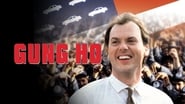Catangro
After playing with our expectations, this turns out to be a very different sort of film.
Hadrina
The movie's neither hopeful in contrived ways, nor hopeless in different contrived ways. Somehow it manages to be wonderful
Aubrey Hackett
While it is a pity that the story wasn't told with more visual finesse, this is trivial compared to our real-world problems. It takes a good movie to put that into perspective.
Guillelmina
The film's masterful storytelling did its job. The message was clear. No need to overdo.
SnoopyStyle
The auto plant in Hadleyville, Pennsylvania had closed down after 35 years. The town is desperate. Foreman Hunt Stevenson (Michael Keaton) travels to Japan to convince Assan Motors to reopen the plant. He's successful to his complete surprise. He's hired by new plant manager Takahara Kazuhiro (Gedde Watanabe) as liaison with the American workers. Takahara had been shamed for being a bad executive. Hunt struggles between the demands from Japanese management and the expectations of the American workers.Director Ron Howard makes light-hearted fun from a difficult subject matter. For the most part, it works for me. It can be off-putting for an audience that is either pro or anti-union. Howard essentially splits the difference by having both workers and management come together in a happy ending. Michael Keaton is fun. He faces the challenge with charm. Another director would make this a tougher movie but Howard is not that guy.
angelsunchained
Just saw this movie again and was utterly shocked how the American workers were portrayed in this film. The U.S. workers all come across as first class jack-asses. They are crude, loud mouth, ignorant, anti social bullies. None of them come across as even remotely likable. Only Micheal Keaton has a bit of compassion. The Japanese are totally stereotyped, but at least they come across as human beings. This is suppose to be a comedy, but there isn't even one laugh.The storyline is interesting regarding a clash of cultures, but the U.S. culture comes in a distant second. Workers are shown as being lazy, unorganized, hot-tempered and below pare. Of course at the end, the workers "man up" to get their acts together, but honestly who cares. They are so unlikeable and come across as only money hungry that you couldn't care less because they are all a bunch of total jack-asses.
gtbarker
This is quite simply the worst film I have ever seen. It's nothing more than an anti-worker propaganda exercise to make everyone think that workers everywhere deserve everything they get. I am sure such a crass message works on the right wing, but to sane people I would hope they see it for the load of 'bosses good-workers bad' garbage that it is. It's almost as though the bosses of the biggest American industries got together and said 'look we all know how successful the Japanese economy and a lot of that is down to a highly disciplined robotically obedient workforce - how could we make American workers perform similarly?' And they came up with this utter rubbish.At the time I was visiting the cinema at least once a week and saw some very good and alternatively some dreadful films, but this one was in a league of it's own and was singley responsible for me deciding to reduce my cinema visits from then on.
TxMike
Just today, holed up with a bad head cold on a wet and dreary day, I watched this old movie. Simply because I wanted to see some old Michael Keaton movies I had missed. This is mostly a comedy just for the sake of comedy, but there is a cultural message here. The Japanese find out how hard it is to have a bunch of blue-collar Pennsylvanians make cars the Japanese way, efficiency, zero defects , and all that. And the Americans find out that they can't just keep on doing "business as usual" and keep jobs in their community.Michael Keaton is auto worker Hunt Stevenson, sent by the mayor to Japan to court Assan Motors in the hopes of re-starting a car factory and re-vitalize their community. Hunt thinks he botches the assignment, but somehow the Japanese are impressed and schedule a visit to the plant site. The deal is made, the workers begin making cars. Defects and all. "We can't make these perfect, those flaws are for the dealer to fix." American Gedde Watanabe is the Japanese plant manager, Oishi Kazihiro. Anyway the movie bogs down a bit in the middle but in the end the Americans and the Japanese figure out ways to respect each others' cultures, and keep the factory going after it had to be shut down briefly.




